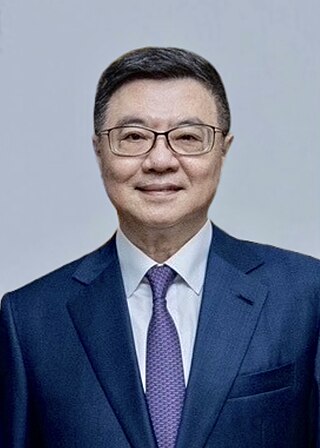
Taiwan, officially the Republic of China (ROC), is governed in a framework of a representative democratic republic under a five-power system first envisioned by Sun Yat-sen in 1906, whereby under the constitutional amendments, the President is head of state and the Premier is head of government, and of a multi-party system. Executive power is exercised by the Executive Yuan. Legislative power is vested primarily in the Legislative Yuan. Taiwan's judiciary is independent of the executive and the legislature. In addition, the Examination Yuan is in charge of validating the qualification of civil servants, and the Control Yuan inspects, reviews, and audits the policies and operations of the government.

The State Council of the People's Republic of China, also known as the Central People's Government, is the chief administrative authority and the national cabinet of China. It is constitutionally the highest administrative organ of the country and the executive organ of the National People's Congress, the highest organ of state power. It is composed of the premier, vice premiers, state councilors, ministers of ministries, directors of committees, the auditor general, and the secretary-general.

The president of the Republic of China, also referred to as the president of Taiwan, is the head of state of the Republic of China (Taiwan) as well as the commander-in-chief of the Republic of China Armed Forces. The position once had authority of ruling over Mainland China before 1949, but its remaining jurisdictions has been limited to Taiwan, Penghu, Kinmen, Matsu, and other smaller islands since the conclusion of the Chinese Civil War.

The Legislative Yuan is the unicameral legislature of the Republic of China (Taiwan) located in Taipei. The Legislative Yuan is composed of 113 members, who are directly elected for four-year terms by people of the Taiwan Area through a parallel voting system.

The premier of China, officially titled the premier of the State Council of the People's Republic of China, is the head of government of China and leader of the State Council. This post was established in 1911 near the end of the Qing dynasty, but the current post dates to 1954, five years after the establishment of the PRC. The premier is the second-highest ranking person in China's political system after the general secretary of the Chinese Communist Party /president, and holds the highest rank in the civil service of the central government.

The National Assembly was the authoritative legislative body of the Republic of China, from 1947 to 2005. Along with the Control Yuan and the Legislative Yuan, the National Assembly formed the tricameral parliament of the Republic of China.

The Constitution of the Republic of China is the fifth and current constitution of the Republic of China (ROC), ratified by the Kuomintang during the Constituent National Assembly session on 25 December 1946, in Nanjing, and adopted on 25 December 1947. The constitution, along with its Additional Articles, remains effective in ROC-controlled territories.

Provinces are the most numerous type of province-level divisions in the People's Republic of China (PRC). There are currently 22 provinces administered by the PRC and one province that is claimed, but not administered, which is Taiwan, currently administered by the Republic of China (ROC).
Paramount leader is an informal term for the most important political figure in the People's Republic of China (PRC). The paramount leader typically controls the Chinese Communist Party (CCP) and the People's Liberation Army (PLA), often holding the titles of CCP General Secretary and Chairman of the Central Military Commission (CMC). The state representative, head of state (president) or head of government (premier) are not necessarily paramount leader—under China's party-state system, CCP roles are politically more important than state titles.

The premier of the Republic of China, officially the president of the Executive Yuan, is the head of the government of the Republic of China of Taiwan and leader of the Executive Yuan. The premier is nominally the principal advisor to the president of the republic and positioned as the head of central government.
The Executive Yuan is the executive branch of the government of the Republic of China (Taiwan). Under the amended constitution, the head of the Executive Yuan is the Premier who is positioned as the head of government and has the power to appoint members to serve in the cabinet, while the ROC President is the head of state under the semi-presidential system, who can appoint the Premier and nominate the members of the cabinet. The Premier may be removed by a vote of no-confidence by a majority of the Legislative Yuan, after which the President may either remove the Premier or dissolve the Legislative Yuan and initiate a new election for legislators.

The Control Yuan is the supervisory and auditory branch of the government of the Republic of China, both during its time in mainland China and Taiwan.

A parliamentary republic is a republic that operates under a parliamentary system of government where the executive branch derives its legitimacy from and is accountable to the legislature. There are a number of variations of parliamentary republics. Most have a clear differentiation between the head of government and the head of state, with the head of government holding real power and the head of state being a ceremonial position, similar to constitutional monarchies. In some countries the head of state has reserve powers to use at their discretion as a non-partisan "referee" of the political process. Some have combined the roles of head of state and head of government, much like presidential systems, but with a dependency upon parliamentary confidence.

The 1st Legislative Yuan election was held in China between 21 and 23 January 1948. This election, and the preceding 1947 National Assembly election are the first elections of under the newly ratified 1947 Constitution of the Republic of China. Under this constitution, the Legislative Yuan is a standing legislature when the National Assembly is not in session. At the time most of Chinese territory was under the control of the government of the Republic of China, using a direct voting system elected 759 Legislative Representatives. Using the Republic's then 461 million population to calculate, on average 600,000 people elected one representative in the Legislative Yuan. The election along with the one held for the National Assembly also made China the largest democracy at the time.

The Government of the Republic of China, is the national authority whose actual-controlled territory consists of main island of Taiwan (Formosa), Penghu, Kinmen, Matsu, and other island groups, collectively known as Taiwan Area or Free Area. A unitary state, the ROC government, under the current constitutional amendments, is run by a de facto semi-presidential system, consists of the presidency and five branches (Yuan): the Executive Yuan, Legislative Yuan, Judicial Yuan, Examination Yuan, and Control Yuan. The president is the head of state, with the premier as the head of government, currently ruled by the Democratic Progressive Party (DPP) since 2016. Since the 2005 amendments of the Additional Articles of the Constitution, the Legislative Yuan has been the de facto unicameral parliamentary body of the country.

The Mongolian and Tibetan Affairs Commission (MTAC) was a ministry-level commission of the Executive Yuan in the Republic of China. It was disbanded on 15 September 2017.

The Directorate-General of Personnel Administration of the Executive Yuan of the Republic of China (Taiwan) is a government body responsible for the overall personnel administration of all ministries and agencies under the Executive Yuan.

Cho Jung-tai is a Taiwanese politician who is the premier of Taiwan since 2024. He served on the Taipei City Council from 1990 to 1998, when he was first elected to the Legislative Yuan. Cho remained a legislator through 2004, when he was appointed deputy secretary-general to the president during the Chen Shui-bian administration. During Frank Hsieh's 2008 presidential bid, Cho assumed the post of Secretary-General of the Democratic Progressive Party. He returned to public service in 2017, as secretary-general of the Executive Yuan under Premier William Lai. In 2019, Cho succeeded Tsai Ing-wen as leader of the Democratic Progressive Party. He remained leader of the party until May 2020, when Tsai resumed the role.

Jiang Yi-huah is a Taiwanese politician and former Premier of Taiwan (ROC). On 29 November 2014, he tendered his resignation and was succeeded by Mao Chi-kuo on 8 December 2014.








































